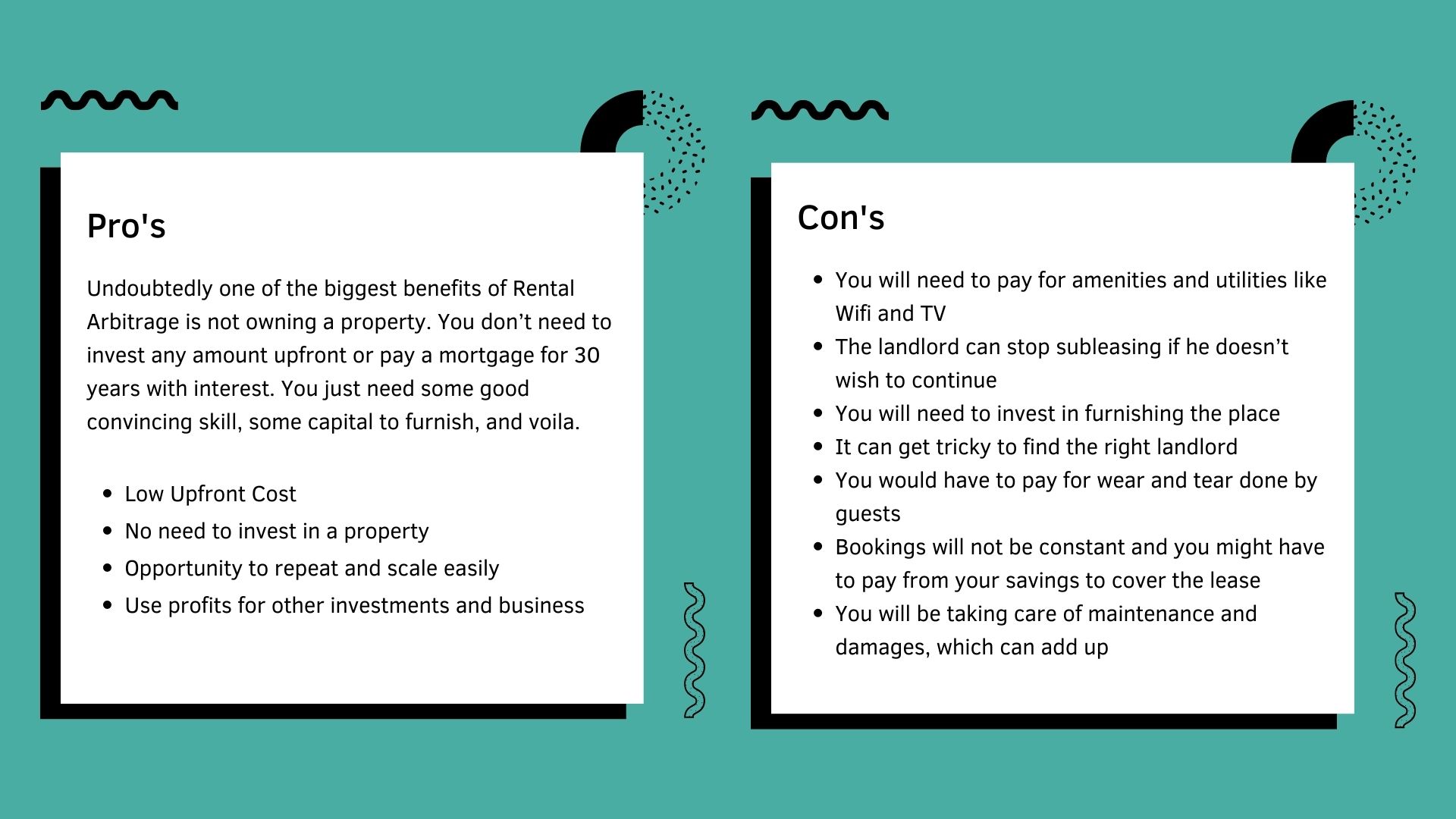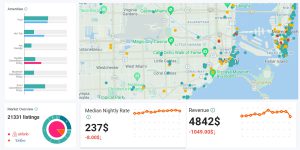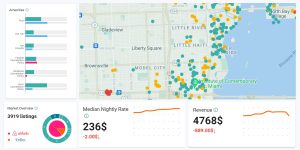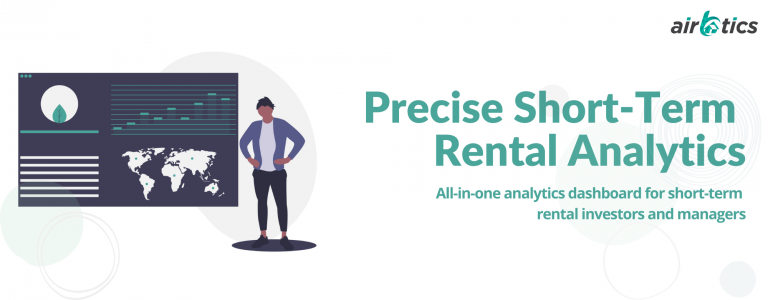What is Rental Arbitrage?
Rental Arbitrage is a method similar to house hacking, however, the only difference is that you don’t own the house. Instead, you convince a landlord to lease you a property which will be furnished and subleased on Airbnb and VRBO.
Rental Arbitrage is a smart technique to earn money in any type of property including a multifamily house, duplexes, or triplexes. You can easily use the money from your short-term rental to pay off your lease and profit some more. If you own a duplex or triplex then it is pretty straightforward and easy. You can live in one section and rent out the other – which is also known as house hacking. People use this after taking a loan on a property and use the rent to pay off the mortgage. The short-term rental income helps you pay for the long-term lease that you have on the house. This helps you keep the difference at the month-end after paying for the long-term lease.
Assume you are renting a duplex in Miami for $1,800/month. You are living by yourself on one of the sides and you decide to sublease the other on Airbnb. Let’s say you listed it for $100/day and got 80% occupancy. This will bring in approx $2,600/month in revenue. Not only will it help you pay off your complete rent, but give you a profit of $800. This, in a nutshell, is called Rental Arbitrage.
Do you want consistent cash flow? Read this article about the Rental Arbitrage business and become a pro!
Things to do before getting started?
How to convince the landlord
Let’s say you want to get into Rental Arbitrage. Now comes the big question, how to find a good property and how to convince the landlord. Later in the blog, we’ll be explaining how to find a good property by doing proper research using Airbnb data analytics. In this section, we will be focusing more on how to convince landlords. As you’ll begin your Rental Arbitrage journey, you’ll come to know that this is the hardest part of the whole process.
You need to be prepared and well researched, good communication skills come in handy here. Also, one thing to always keep in mind: never sublease without informing the landlord, there will be a huge number of people coming in and going out when you’re sub renting, it will not be hard for the landlord to figure out that you are subletting and you might end up getting in trouble.
For the convincing, rule number one is always talking about the upsides. If you can rent the property on Airbnb, so can the landlord himself. You need to make a deal with the landlord that is beneficial to them. So they lease the property to you instead of renting it by themselves.
Points to tell an indecisive landlord.
- Doing Rental Arbitrage is a full-time business. It doesn’t generate passive income like long-term leasing. You should try approaching older people who are looking for some sort of passive income. They are more likely to agree to a fixed long-term lease. You can also reach out to full-time working professionals or business owners. They will also be happy with a source of passive income till their property is well maintained. This brings us to our next point.
- You are more likely to take care of the house than a normal renter. As you are using the property to do business you will take good care of it to make sure you get better reviews. Having a beat-up property isn’t good for business and you are more likely to monitor it often. Not monitoring it will affect your revenue a lot. You may end up paying a huge sum of money for damages done by someone else. So telling this to the landlord might instill some confidence in them.
- You can ensure timely monthly rent. You can tell the landlord that doing Rental Arbitrage is a full-time business with ups and downs. It doesn’t guarantee fixed income at all like long-term leasing. But if they lease it to you, you’ll make sure to pay the lease no matter what. Either from the money made after rental arbitrage or from your savings. You need to ensure timely monthly lease payments to gain the trust of a landlord.
In conclusion, you need to take care of the property like your own. Make sure to timely pay the monthly lease and keep the situation beneficial for both parties.
Ensure the Property and Gain landlords trust
Being on the safe side is always a good idea. From trouble guests to bothering landlords. You need to make sure you are using the right tools to ensure the property is safe and neighbors are happy. Many landlords will have this concern when renting out their property to you. They will be worried about neighbors raising noise complaints. It is a legitimate concern. To help you with all these problems, here are some suggestions that you can implement and have peace of mind.
- Simply Safe – These are home monitoring tools that you can install in the house to make sure no suspicious activity is happening there. Make sure to let the guests know about them and have their consent.
- Auto host – Automatically screens problematic tenants.
- Alexa Guard: If you already own an Alexa, you can use its Alexa guard feature to detect parties. It is an inbuilt feature that monitors changes in sound and sends you an alert in case the guests are having a party and making too much noise.
- InsuraGuest – This insurance and tech company helps you with risk analysis and gives protection beyond Airbnb and VRBO policies.
- Short-term Rental Calculator – Give your landlord ease of mind by providing income estimates backed by Airbnb data.
You can integrate the majority of these tools with a PMS of your choice.

Pro’s and Con’s

What is the initial cost of starting rental arbitrage in Miami?
You can expect to spend anywhere between $3,000 to $5,000. This cost includes Deposit, Furnishing, Amenities, Legal Paperwork, and LLC Incorporation.
But doesn’t this contradict the Low upfront cost of Rental Arbitrage? Well, these estimates vary from city to city. There is a possibility to do Rental Arbitrage for even less than this depending upon your situation and the type of property you lease.
Still, the amount is lesser than investing in a new property and getting a mortgage of thousands of dollars. In addition to this, you won’t be on the hook for property maintenance expenses and being stuck for years with debt.
But this doesn’t mean Rental Arbitrage can be done with zero or very tight budget. There will be some upfront costs that you have to expect so it’s ideal to own some extra cash is also a good thing to have. This will help pay off the lease during off-season in case bookings don’t happen right away.
Expense 1: Rental Deposits
A rental deposit is going to be one of the first and major expenses. You would need money to be able to sign a long-term lease with the landlord. Therefore, you will need a security deposit, along with your payment for the first and last month’s rent. Sometimes you can negotiate with the landlord and use the first month’s rent as a security deposit.
Expense 2: Furnishing
Most of the time you should always aim to lease a place that is semi-furnished. As someone with a fully furnished home might be doing short-term rentals themselves. Also furnishing a place from scratch can add anywhere from $3,000 to $5,000 to your initial capital.
If the place is semi-furnished, then your best bet is to shop for cheap stuff. You can go and find cheap supplies from places like Home Depot and IKEA. Sometimes even Walmart can have a hidden gem if you look closely.
Expense 3: Photography
Do it yourself! iPhones have good cameras. DIY photography will save you some money.
Expense 4: Cleaning Services
This is included in the starting costs, but you will eventually end up spending on cleaning services. The best way to save money is to do it yourself initially if you have the skills and experience.
If you have no experience or you don’t want to invest time in cleaning a place. Then your best bet will be to hire a professional cleaner. This can cost you anywhere from $50 to $250 depending upon the size and location.
Expense 5: Legal Consultation
Maintaining a professional relationship with a Real Estate lawyer can be very helpful in the Airbnb business. Airbnb regulations keep updating and you would need some legal guidance on the way to adjust your business accordingly.
They can also come in handy if you face any legal issues with the landlord or guests. They can help in damage claims and insurance as well in case of any mishappening.
Legality and Regulations in Miami
There are a variety of state, county, and city requirements and regulations to follow when operating a short-term rental in Miami and Miami Beach. The following is a detailed breakdown of the short-term rental regulations in Miami-Dade County, as well as the cities of Miami and Miami Beach.
Miami Dade County
- A Certificate of Use from Miami-Dade County is required to run a short-term rental in the county.
- The Certificate of Use in Miami-Dade is valid for one year and can be renewed annually as long as all conditions are still completed and there are no outstanding fines or liens for violations of the County Code in Miami-Dade.
- The responsible party or host must reside in the short-term rental property for more than six months per calendar year for properties in designated Estate or Low-Density Residential regions.
- When a property is utilized as a vacation rental, the CU must be posted in a prominent position within the vacation rental that is readily accessible to visitors and must include, at a minimum, the name, address, and phone number of the responsible party as well as the vacation rental’s maximum occupancy.
- The responsible party or host must reside in the short-term rental property for more than six months per calendar year for properties in designated Estate or Low-Density Residential regions.
- Along with zone restrictions, the responsible party of a short-term rental must keep a register of all guests’ identities and dates of stay, which the Miami-Dade county can review.
North Beach short-term rentals
Short-term rentals are strictly prohibited at North Beach, although they may be permitted if certain conditions are met. Reservations for the full home for a minimum of seven nights are permitted in this region. They must also pay resort taxes. In addition to these requirements, a fee of $1,000 is required to apply for a Certificate of Use for running short-term rentals in North Beach.
Reference | Keycafe | Guestable
Best areas for Rental Arbitrage Miami
1. Little Havana

According to our Airbtics Dashboard, Little Havana is the top market to start your Rental Arbitrage business. There are more than 18,589 Airbnb listings with 3,911 private rooms properties and 5,821 one-bedroom properties. The monthly revenue for most properties is more than $4,842/month with occupancy being more than 65%.
2. Little Haiti

According to our Airbtics Dashboard, Little Haiti is the second-best market to start your Rental Arbitrage business. There are more than 3,351 Airbnb listings with 607 private rooms properties and 1,022 one-bedroom properties. The monthly revenue for most properties is more than $4,768/month with occupancy being more than 62%.
To see full data of Miami – Click Here
Find Stats for your City – CLICK HERE
Read More – Rental Arbitrage Australia





